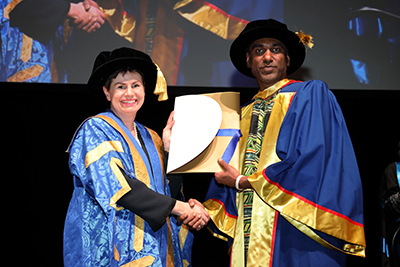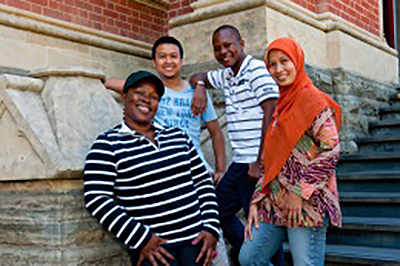Achievements and Announcements
ACHIEVEMENTS
- Activist and advocate for justice Amnesty leader Dr Kumi Naidoo awarded Honorary Doctorate
- UniSA researchers named finalists in science excellence awards
ANNOUNCEMENTS
- UniSA finds education and support helps young refugees thrive
- Feedback on Enterprise25 discussion paper closing soon
ACHIEVEMENTS
Activist and advocate for justice Amnesty leader Dr Kumi Naidoo awarded Honorary Doctorate
 Dr Kumi Naidoo receiving his Honorary Doctorate. Photo: The Bob Hawke Prime Ministerial Centre.
Dr Kumi Naidoo receiving his Honorary Doctorate. Photo: The Bob Hawke Prime Ministerial Centre.UniSA has paid tribute to the Secretary General of Amnesty International, Dr Kumi Naidoo, during a visit to Adelaide by conferring him an Honorary Doctor in recognition of his commitment to social justice.
The award was presented at the Hawke Centre’s Amnesty International Oration – Human Rights in a Time of Tolerance and Hate, held at the Adelaide Convention Centre in June.
UniSA Chancellor Pauline Carr said she was proud to present the award to a man who has made an active commitment to justice from a very early age.
“It is not every 15-year-old that is willing to get expelled from high school because of the passion of his beliefs, but growing up in South Africa during apartheid, Kumi felt compelled to protest injustice, to organise rallies and engage in civil disobedience – and he got expelled,” Carr says.
“He was also arrested, and with pressure mounting, the teenager was forced to live underground and eventually continue his education in exile in the UK where he was awarded a Rhodes Scholarship to attend Oxford University where he studied for his PhD in political sociology.
“Kumi returned to South Africa in the 1990s when Nelson Mandela was released from Robben Island and apartheid was crumbling.
“He was living there working on legislation for the African National Congress on adult literacy and voter education campaigns during the same period that UniSA awarded Mandela an Honorary Doctorate in recognition of his enormous contribution to social justice, civil societies and healing through reconciliation.
“The connections we have had with South Africa through the Mandela legacy and before that, through our academic relationship with Fort Hare University and its distance education program, are deep, and in acknowledging Kumi, we acknowledge the importance of all people who stand up and become agents for positive change.”
Dr Naidoo has gone on to hold many international leadership roles – Chair of the Global Call for Climate Action, Founding Chair of the Global Call to Action Against Poverty, Co-founder of Africans Rising for Justice, Peace and Dignity and Executive Director of Greenpeace International.
“Kumi has always been an alliance builder,” Carr says.
“He understands that rights don’t exist in isolation – that issues like climate change are tied to racial inequality – that sex discrimination is embedded in the economic exclusion of women and right here in Australia, we too understand, that access to education is vital if we are to eliminate poverty and disadvantage.
“We share his passion for education and equality of opportunity and we’re delighted to welcome Dr Kumi Naidoo to the UniSA community.”
Dr Naidoo said he was deeply honoured to receive the award.
In delivering the 2019 Amnesty International Oration, he called on the government to “end the overimprisonment of Indigenous children by raising the age of criminal responsibility from 10 to 14 years” and adequately funding Indigenous-led prevention and diversion programs.
“Our children should be at school, our children should be with their families, our children should be planning their first sleepovers at 10, 11, 12 – not in prison,” he said.
“And the fact that it’s so racially biased, and the fact that the majority of children (in prison) are from Indigenous backgrounds, is particularly revealing.”
He said solutions led by Indigenous people were key.
“We should be listening to the people who know best,” Dr Naidoo said. “Sadly governments around the world are failing to listen to the people that suffer the most egregious injustices.
“No child, Indigenous or not, should be put in prison, especially when they have not been found guilty of a crime – because many of them are on remand.”
He said change begins with moral courage.
“As we used to say during apartheid, we are either part of the problem or part of the solution,” Dr Naidoo said. “And choosing to be neutral in a context where there’s an issue of children being violated in this way is a choice – choosing to be part of the problem.”
UniSA researchers named finalists in science excellence awards
The incredible work of five UniSA researchers has been recognised through the 2019 SA Science Excellence Awards after they were named as finalists.
The SA Science Excellence Awards recognise and reward outstanding scientific endeavours, including its application in industry and the advancement of science, technology, engineering and mathematics (STEM) education.
UniSA features in four of the six award categories: Scientist of the Year, Excellence in Research Collaboration, PhD Research Excellence Award, and STEM Educator of the Year – Tertiary Teaching.
Director of UniSA’s Future Industries Institute Professor Emily Hilder and Chair of Cancer Biology at the Centre of Cancer Biology Professor Sharad Kumar are both in the running to be named South Australian Scientist of the Year.
UniSA PhD graduates Dr Dorothea Dumuid and Dr Tahnee Dening are finalists in the PhD Research Excellence category.
Program Director: Environmental Science and Geospatial Science Associate Professor Tom Raimondo is one of three finalists in the STEM Educator of the Year - Tertiary Teaching category.
In addition, the Data to Decision Cooperative Research Centre (CRC) is a finalist in the Excellence in Research Collaboration category. UniSA was the lead organisation for the CRC, which brought together researchers and industries in order to overcome the big data challenges facing Australia’s national security and law enforcement agencies.
The South Australian Scientist of the Year will receive a prize to the value of $25,000. The winners of other categories will receive a prize to the value of $10,000 to use towards their career development.
The winners will be announced on 9 August.
ANNOUNCEMENTS
UniSA finds education and support helps young refugees thrive

Research from UniSA has highlighted the rich cultural diversity of youth with refugee backgrounds in South Australia and early findings suggest that these young Australians are actively engaged in education and are successfully working towards high aspirations.
In a major report, Demographic Profile of SA Refugee Youth Population 2019, released as part of an Australian Research Council-funded research project looking at refugees’ transition from school to further education, training and employment, researchers have shown that positive education experiences can be the vital key to future success, professionally and personally for refugees.
Lead researcher Associate Professor Tahereh Ziaian says the secondary analysis of ABS data, coupled with more than 630 surveys and more than 100 interviews with young refugees, their educators, and their families, makes the project the largest of its kind focused on young refugees.
“This lays down a really rich dataset and it will be invaluable in formulating policy and strategies to ensure refugee settlement and success is made easier for the thousands of young people who start their new lives in Australia,” Assoc Prof Ziaian says.
“This is an important stage in our research because from our survey with young refugees we have built a comprehensive picture of their triumphs and challenges.”
The survey group from South Australian included young refugees aged between 15 and 24 years from three core regions – Africa, the Middle East and South Asia – most of whom have been living in Australia for between 1 and 10 years.
“We know their countries of origin, their family structure, their education, both before and after arrival, their language skills and also information on their attitudes and experiences, their ambitions, how they are progressing personally and what factors are influencing their success in Australia.”
The aim of the research, which has been undertaken in partnership with The University of Adelaide, Multicultural Youth SA and the Australian Migrant Resource Centre, is to investigate education and employment outcomes and pathways for refugees, to better inform education, training and employment policy and practice.
“It is clear from this work that the pattern of refugee settlement is directly related to areas of conflict around the world – so the numbers of young refugees coming to SA are clearly from nations where they have had to flee war and conflict to find safety – places such as Syria, Myanmar, South Sudan and Afghanistan,” Assoc Prof Ziaian says.
“We have also observed some very positive indications that increased culturally appropriate support for students and their families, better resources for adolescent English learners, and active promotion of inclusive school culture, are all building blocks for improved self-esteem and resilience in young people from refugee backgrounds.”
Read the full story on UniSA’s Media Centre.
A preliminary selection of findings from the survey were presented in a that was launched by the Governor of South Australia Hieu Van Le AC in late June. See photos from the launch in the In Pictures section of UniSA News.
Feedback on Enterprise25 discussion paper closing soon
A key commitment in the University’s strategic plan, Enterprise25, is to introduce a program-focused organisational structure.
A discussion paper is currently open for the University community to provide feedback on the proposal. All responses are encouraged.
Feedback on the discussion paper will close at 5pm Friday 19 July.
The discussion paper is available on the Enterprise25: Transforming our Academic Enterprise website.
Other Stories
- Using free public wifi could be putting you at risk of cyber attack
- Why it’s time to start thinking about batteries for your rooftop solar
- Storytelling technology to revolutionise criminal convictions
- Being environmentally responsible is good for the bottom line
- From the Vice Chancellor
- Achievements and Announcements
- Problematic sexual behaviour among young children raises concerns for teachers
- UniSA thriving in World Young University rankings
- Mobiles can help you better manage your medications
- Hoodie culture a winner for Aboriginal artist
- War veterans tap into their creative side at UniSA
- We asked a UniSA student to review MOD.’s new exhibition
- What it’s like for a student from Peru to study in Adelaide
- The latest books from UniSA researchers
- Maple Leaf, microengineering school and Refugee Week events



